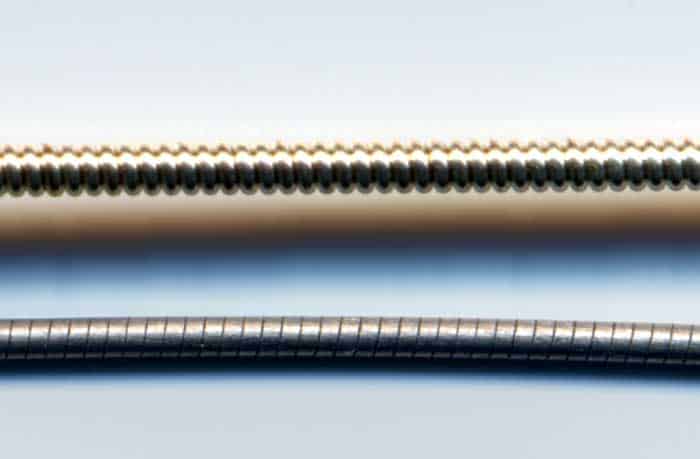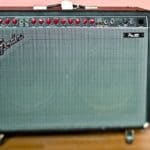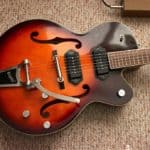Most probably you’re already playing with roundwound strings and wonder what a set of flat wounds will sound like.
It’s clear that roundwounds are the status quo, at least in the vast majority of genres. But roundwounds have their select fans.
The main differences between roundwound and flatwound strings are construction, sound, and lifespan. Roundwounds have a core wire and a wrap-around round wire, flatwounds have a flat wrap and a smoother surface. Flatwounds have less high-end and last longer. Roundowunds are brighter and die off faster.
Especially in between jazz players the divide is more obvious. The player’s choice in this genre has not yet come to a consensus, and maybe never will.
That’s the amazing thing about gear, it all comes down to taste, and 90% of the time, it doesn’t matter at all.
But we still love it.
In this article, we will put these two kinds of strings side to side, talk about their virtues and their drawbacks. We’ll compare them side by side, and then we’ll give you our final thoughts on the matter.
Flatwound strings main characteristics
Modern guitar and bass guitar strings are made with 2 basic components, a string core, and a wrap-around. Usually, they’re made of stainless steel.
The main characteristic of flatwound strings is that the wrap wire is flat and not round. This makes for a smoother surface to the touch. String friction is reduced a lot which will make sliding, for instance, easier.
About their tone, flatwound strings have a reduced high end giving more presence to the low and mid-range of the sound.
Do flatwound strings last longer than roundwounds?
Many players consider flatwounds strings to last longer. This might be explained by 2 different factors:
- As there are no ridges in the string surface (compared to roundwounds) there’s less oil and dead skin buildup, two of the most prevalent causes of string deterioration
- Given that flatwounds sound less bright from the start of their life, and players choose them for this quality mostly, there’s not a great decline in their tonal character during their “lifespan”. One will not notice their loss of high-end as easily as with roundwounds because there’s less high-end to start with.
Famous players that use flatwound strings
These are some famous players that are known for using flatwound strings at least at some point in their careers:
- Albert King
- Bob Weir
- Pat Metheny
- Jim Hall
- Steve Harris
- Joe Osborn
- Steve Lawson
- John Paul Jones
- James Jamerson
- Carol Kaye
- Paul McCartney
Flatwound strings for jazz guitar
The low-high-end sound that flatwound strings are famous for is very desired between jazz guitar players.
This results in the majority of guitar flatwound users being within the jazz spectrum. This doesn’t mean that EVERY or MOST jazz guitarist chooses flatwounds.
There are many who stick to roundwounds, especially the most fusion-oriented or just younger ones tend to stick with the guitar tradition.
Flatwound vs tapewound strings
A variation of flatwound strings are tapewounds. In this case, the construction is still the same, a core wire wrapped with a wire made of nonmetal material. The most common material used is nylon. This makes for an even more smooth sound, with less high-end.
Roundwound strings main characteristics
Roundowund strings are the guitar standards. Chances are the guitar closer to you is now strung with this kind of string.
Their construction is the same as with flatwounds, the only difference is that the wrap wire is round and this makes for ridges that are felt easily in your hands. They’re usually wrapped in nickel.
Guitar’s higher strings (the thinner ones) are not wound, lower ones are most commonly roundwound.
Bass strings are usually all roundwound.
This kind of string retains more high-end and has a more balanced tone overall. They’re also perceived to die off faster because they accumulate more “dirt” between their ridges and lose high-end faster.
Famous jazz players that use roundwound strings
As roundwound is the norm both for guitar and bass guitar, what it’s interesting to see is who uses roundwounds in the jazz niche which is more open to the flatwound alternative.
Here’s a list of some jazz players known for using roundwound strings:
- Julian Lage
- Mike Moreno
- Adam Rogers
- Gilad Heckselman
- Rotem Sivan
- Lage Lund
- Jonathan Kriesberg
- Lionel Loueke
- Dan Wilson
Main differences between flatwound and roundwound strings
As we’ve seen until now, these 2 kinds of strings have some pronounced dissimilarities.
With a distinctive sound for each one, the main differences between flatwound and roundwound strings are:
| Spec | Roundwounds | Flatwounds |
| Price | Cheaper | More expensive |
| Life span | Shorter | Longer |
| Tone quality | More high-end | Less high-end |
| Most common material | Nickel | Stainless-steel |
| Sustain | More | Less |
| String noise | More | Less |
| Upper harmonics | Sharper | More in tune |
| Inharmonicity (tuning of upper harmonics) | Less | More |
Which one should you choose?
A player’s choice is a very personal decision. We don’t usually like making them for our readers.
What we recommend is that you try out both experiences with the same guitar and then make up your mind for which one you liked the most.
We will however make some final points that might help you make your mind:
- If you’re a jazz player, try out the flatwounds
- If you play rock, stick with the roundwounds
- If you prefer a smoother less bright tone, use flatwounds
- If you like a brighter, more balanced sound, pick a set of roundwounds

Hello there, my name is Ramiro and I’ve been playing guitar for almost 20 years. I’m obsessed with everything gear-related and I thought it might be worth sharing it. From guitars, pedals, amps, and synths to studio gear and production tips, I hope you find what I post here useful, and I’ll try my best to keep it entertaining also.





